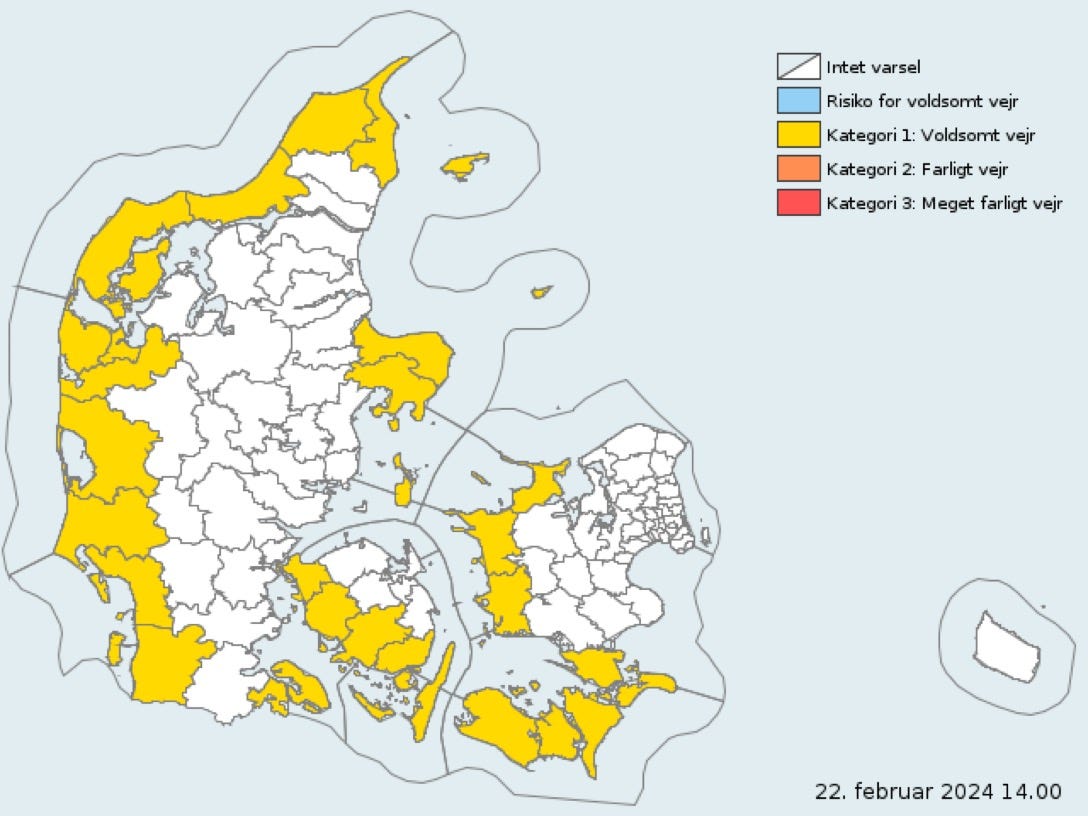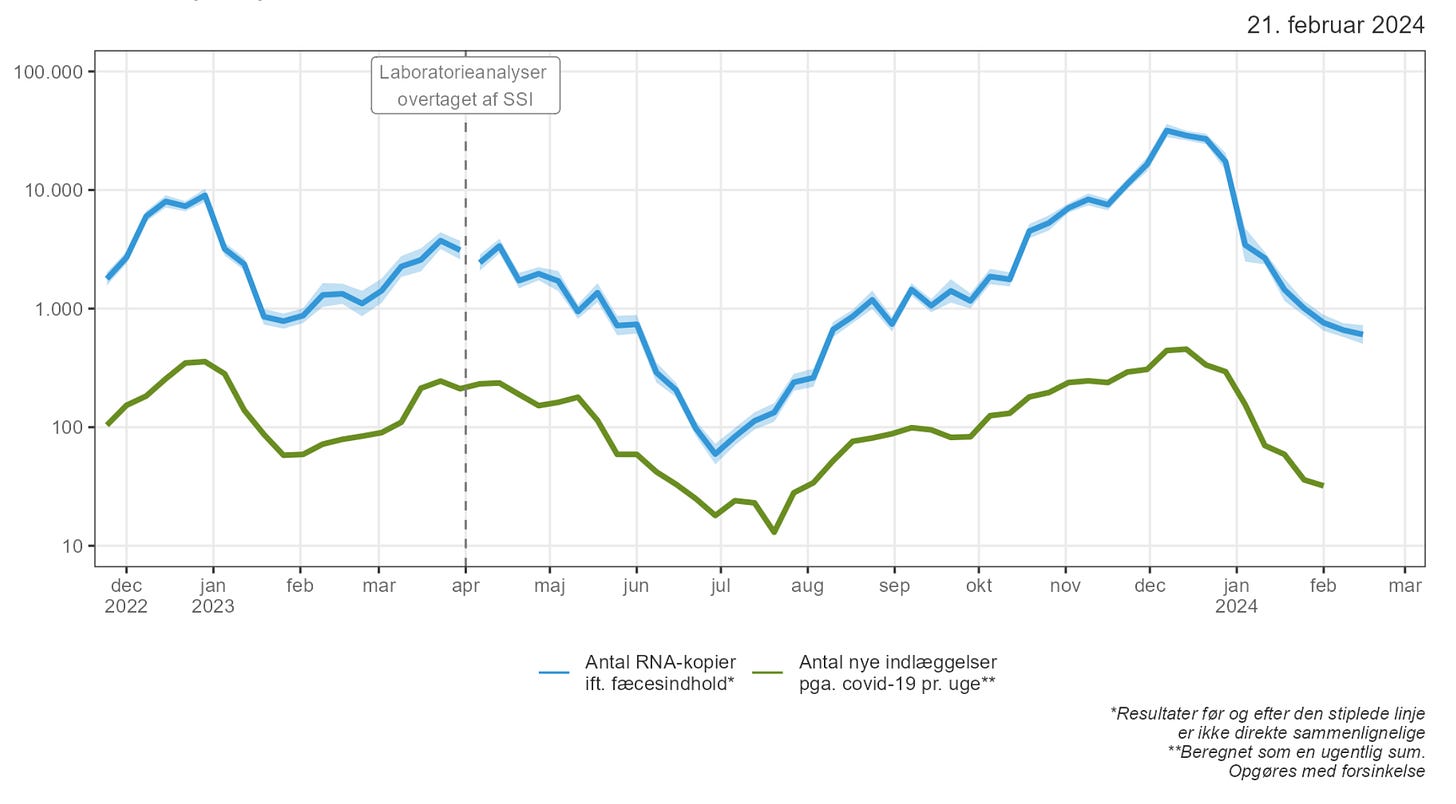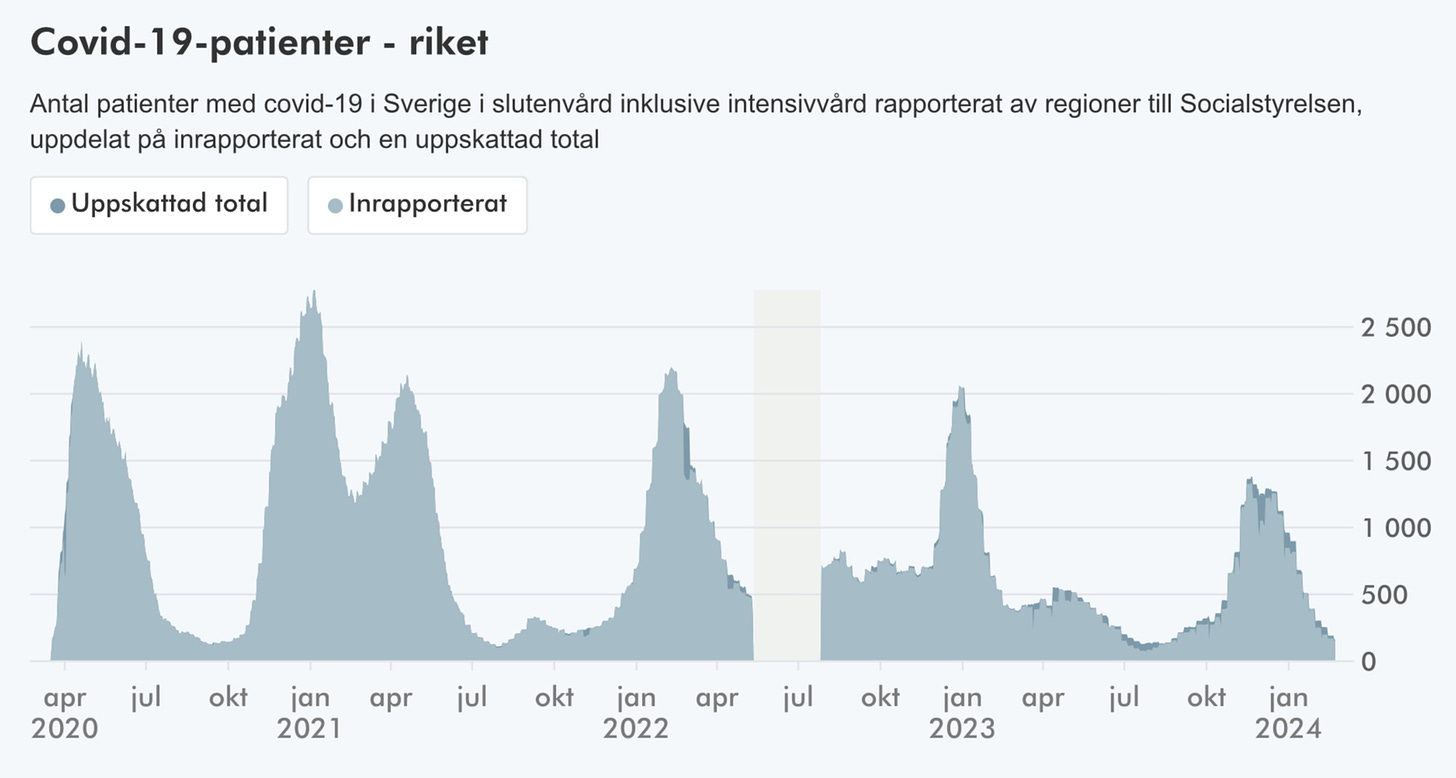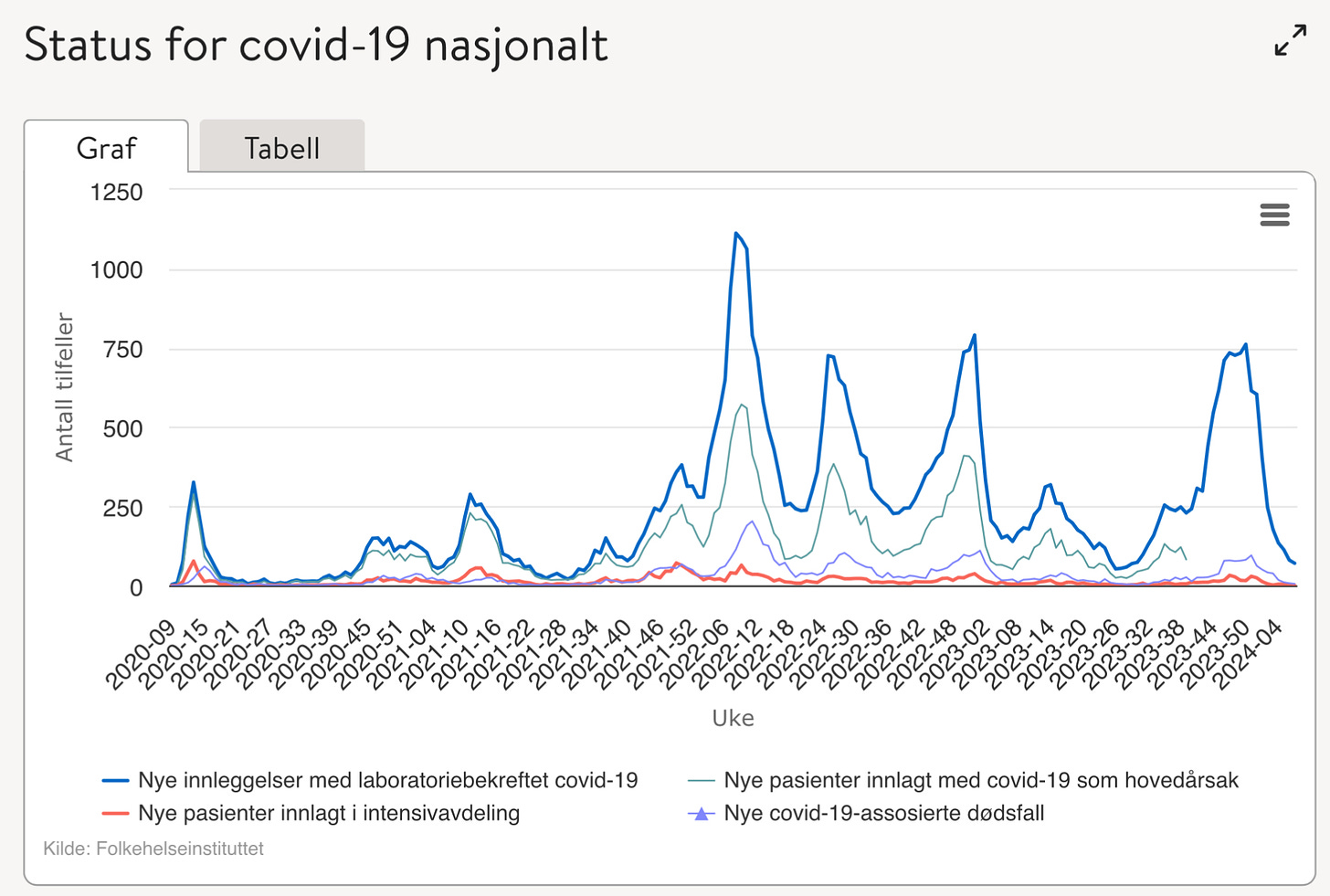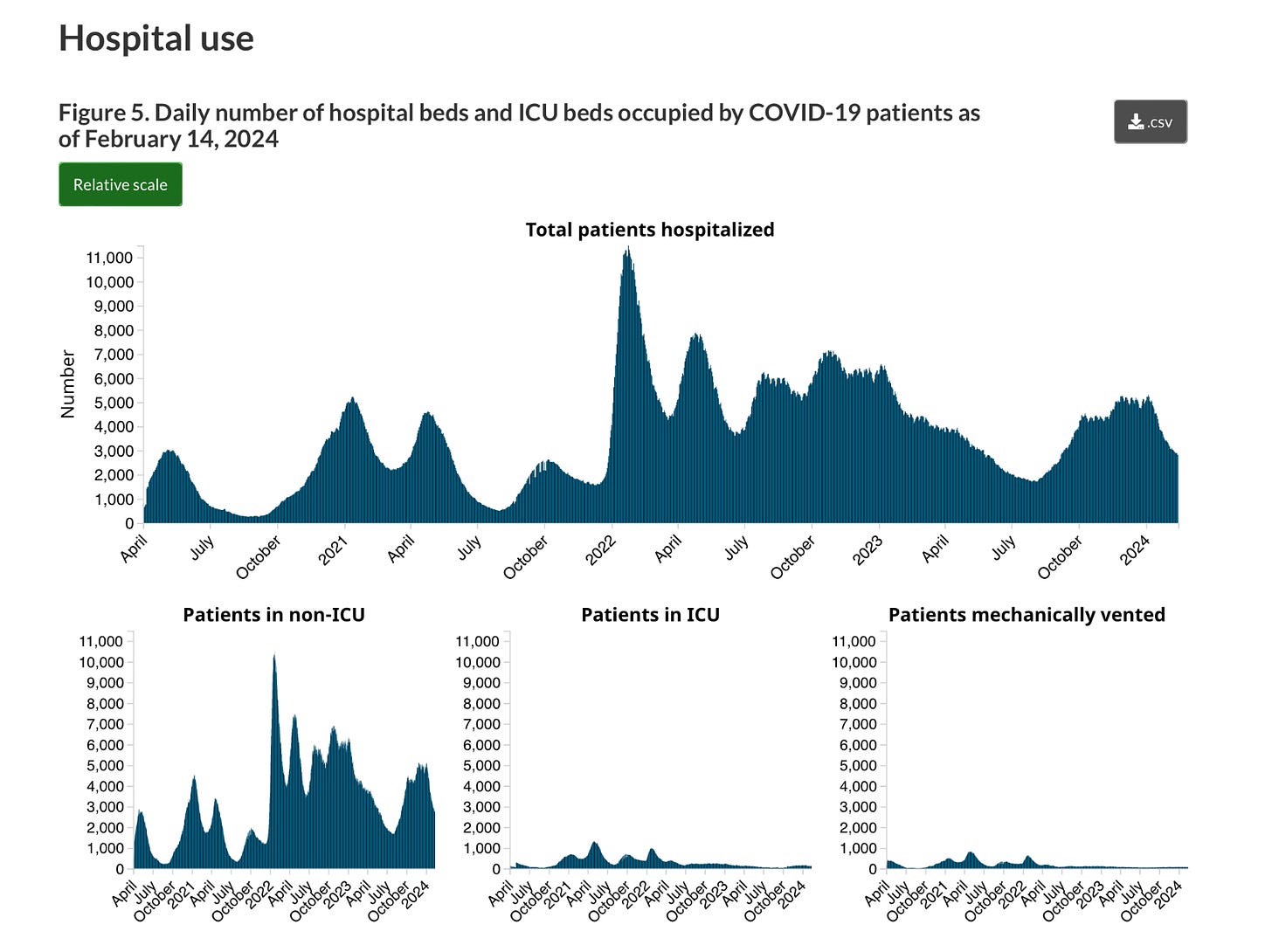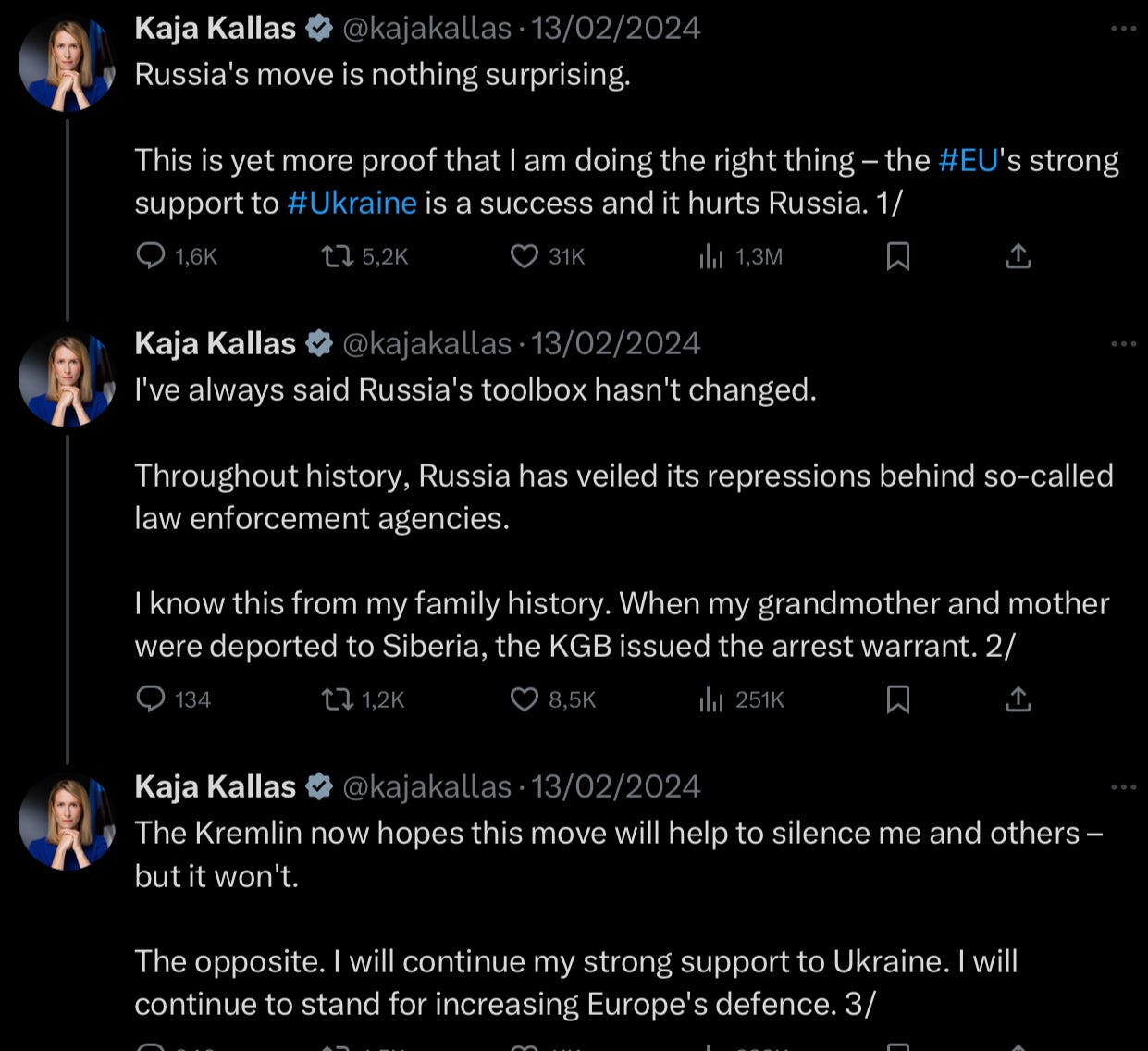The Evening Report - Feb 22
A soaking wet winter in Denmark. Sweden’s long wait may be at an end.
🇩🇰Weather Warning🇩🇰
Here comes the wind. The Danish Meteorological Institute has issued a gale force warning for Friday afternoon and into the night. Winds could be especially strong along the west coast of Jutland, the Western edge of Denmark along the Baltic Sea, and along the Kattegat. The institute warns that in some areas winds could reach hurricane strength. DMI says along with the wind will come some rain.
“The precise path and deepening of the low pressure is still somewhat uncertain, which is why it is still somewhat uncertain how strong the wind will be and which areas will be hardest hit.”
🍃Environment & Energy⚡️
🌍 🇩🇰
It is almost a certainty that February will be the hottest on record even though the month isn’t even over yet. That is according to Eigil Kaas, who is a professor of climate physics and meteorology at the Niels Bohr Institute in Denmark. Preliminary figures from the University of Maine in the USA also back up his prediction.
Around the globe weather stations in South Africa, Saudi Arabia, Indonesia, Japan, Morocco, and Belize have all registered heat records this month.
While human-caused climate change has been a big contributor, the El Niño weather phenomenon has also helped drive temperatures upwards. However, next year may see a marked change. Kass tells DR that 2025 could see the arrival of La Niña the exact opposite weather phenomenon.
“In other words, where it gets cooler in the Pacific Ocean and thus has all possible side effects of that in the atmosphere. But that's a guess because we can't predict it very precisely yet.”
But he emphasizes while El Niño and La Niña can cause warmer and colder weather trends human-caused CO2 emissions have ensured that global temperatures will continue to trend upwards regardless.
🇩🇰
It continues to be a soaking wet winter in Denmark. So far this year there has been 42% more rainfall than usual. The 30-year average rainfall for January is 65.3 millimeters and for February it is 50.3 mm. January of this year recorded 84.8 mm of rain and so far in February we have seen 79.2 mm. According to the Danish Meteorological Institute, even more rain is on the way over the next week or so.
Denmark recorded the wettest year ever in 2023.
-
The soggy winter weather is increasing the risk of landslides. A section of Denmark’s famed white cliffs at Møns Klint has slid into the sea. It is the fourth landslide at Møns Klint so far this year. The constant rain has saturated the soil and increased the level of groundwater and along with it the risk of landslides.
Geocenter Møns Klint is recommending people stay away from the cliff edges and from walking on the beach below until things dry out.
-
As massive amounts of rain and historic storm surges compound repeated flooding events across Denmark at least one municipality is looking at making a serious flood mitigation effort. In Esbjerg on the western coast of Jutland, the municipal council has decided to forfeit ahead with a two-year 47 million Danish kroner project (about $9.2 million Cdn) to build a two-kilometer-long flood barrier along the city’s waterfront. The planned wall would provide protection against future storm surges of up to 4.8 meters.
Denmark’s Coastal Directorate has designated Esbjerg and 13 other areas as being at high risk for flooding. It forecasts that such a wall will protect the city until at least 2065. It will contribute 17 million Danish kroner for the project.
A very similar storm surge protection barrier has already proved to be successful in the Danish coastal community of Lemvig, as pictured below.
-
An expert group tabled their long-awaited recommendations on a possible agriculture-specific carbon tax in Denmark. The report suggests a climate tax of between 125 kroner ($24.50 Cdn) and 750 kroner ($147 Cdn) per tonne of CO2. It also calculated the potential job losses in the agricultural sector. At the highest end, it could mean 7,950 fewer workers by 2030. At the lower end, job losses would equal approximately 2,000.
Expert Group Chair Michael Svarer stresses this will all equal out in the wash.
“However, it will not have an impact on overall employment. What will happen is that the employees that lose their jobs in agriculture will find employment in other sectors.”
With the report now on the table the next move will be up to the politicians.
-
Denmark’s capital region is dealing with a potential environmental threat to Roskilde Fjord. Testing at a former steel mill in Frederiksværk has confirmed environmentally harmful substances. A pollution study carried out by Region Hovedstaden has concluded there is “probably” a risk to water in the fjord. The news lends new urgency to come up with a clean-up and mitigation plan before things get worse.
-
While the environmental threat posed by the creeping landslide at the Nordic Wasteland site near Randers there is some good news this week. The Danish Ministry of Environment says the slope has stabilized a little and that means it no longer poses a risk of rolling over the village of Ølst.
Environment Minister Magnus Heunicke:
“Even though the landslide is stabilizing, there is still a risk of damage to the environment via the surface water that runs from the landslide down towards Alling Å.”
An Å in Danish is a stream. The tonnes of creeping toxic soil contain heavy metals and other pollutants.
-
More than a thousand fish have died in an inlet of Vilsted Sø (lake) in North Jutland and no one knows why. Emergency services and the Vesthimmerlands municipal nature and environment departments all responded but so far have come up with no tangible reason why the fish have all died. The Kommune says oxygen levels in the water are good, the water does not smell, and there is no other indication of some kind of spill into the lake.
It isn’t the first time large amounts of dead fish have been found in the inlet. Samples of the lake water have been sent for testing with the hopes the results will shed some light on the mystery.
🇫🇮
A new study in Finland is working to quantify the impacts of human-caused climate change. Researchers at the Finnish Meteorological Institute focused on areas of the country where temperatures have been recorded for a long time. Among them was Finland’s longest-operating weather station, Kaisaniemi, which has been recording temperatures in the Finnish capital of Helsinki since 1844.
The study concluded that temperatures in Helsinki were the warmest ever recorded in September and that without human-caused CO2 emissions that would not have been the case.
"Our results suggest that anthropogenic climate change made the warmth of September 2023 about nine times more likely and about 1.4 degrees Celsius warmer than it would have been without climate change. Thus, a new record would probably not have been set without the observed global warming. Worldwide, September 2023 was the warmest on record. It was already clear then that ongoing global warming was intensifying heat waves. Now we were able to determine the [warming's] effect.”
-
The transition from gas to electric vehicles in Finland is being hampered by an inadequate charging network across the country. Finnish newspaper Maaseudun Tulevaisuus reports that while more populated southern and western Finland has a dense network of charging stations they are much more scarce elsewhere.
Last month, the Finnish Automobile and Touring Club and charging network provider Virta conducted a joint survey on the desire to ditch gas vehicles for electric ones. 29% of respondents said they had already moved to electric, 31% are considering it, and 49% said a lack of charging stations is preventing them from making the switch.
That said, the EV revolution continues in Finland with the number of electric cars on the road in 2023 almost doubling year over year.
🇩🇰
The possibility of a new wind farm in Denmark’s Hjørring Municipality is a step closer to becoming a reality. The kommune’s finance committee voted in support of the project and its 185 meter high wind turbines. However, there is some concern in the community because the project is so close to a historic medieval abbey called Børglum Kloster. The municipality is trying to get the kloster approved as a UNESCO World Heritage Site and wind farm opponents say the towering wind turbines could put an end to that.
Hjørring council will make a final decision on the wind farm proposal at a meeting in the Northern Jutland community on February 28.
🇸🇪
Inflation rates in Sweden are rising again. Last month inflation was pegged at 3.3%, a full percentage point higher than December. Higher energy and food prices are getting the blame.
🦠Outbreaks🦠
🇩🇰
Water levels in Denmark are so high and everything is so saturated that wastewater is so diluted that the Statens Serum Institute cannot accurately determine COVID activity levels over the last three weeks. That said, the institute says to the best of its ability it has determined that coronavirus activity (blue line) is likely unchanged week to week.
The SSI says that the number of confirmed infections and infection-related hospitalizations for both influenza and the RS virus have fallen over the last three weeks.
That said, influenza-related hospitalizations account for the most hospital admissions among the big three respiratory viruses.
The institute has also declared a months-long whooping cough epidemic to be over.
-
A new Danish study has found evidence linking COVID infections with an increase in neurological disorders.
The study conducted by the Statens Serum Institute followed almost 1.8 million people over the age of 12 from the beginning of the pandemic until January 2023. They then cross-referenced every confirmed COVID infection with hospital admissions relating to psychiatric and neurological diagnoses. Results were then compared with people who hadn’t had a confirmed coronavirus infection.
Professor Anders Hviid led the study:
"We did not observe more psychiatric diagnoses, but there were slightly more neurological diagnoses than expected. Those were mostly things like headaches and sleep disturbances, and then of course the loss of senses of taste and smell. We did not see correlations with fatigue, exhaustion, or dementia, which are some of the things that have been highlighted from other studies.”
The study found a 5% increase in neurological disorders after a COVID infection
“We saw that the hospitalized patients with severe coronavirus infections had significantly more psychiatric and neurological diagnoses. Conversely, we also saw that there were fewer diagnoses among those infection with the Omicron variant and people who had been vaccinated.”
You can find the study in full HERE.
🇸🇪
In Sweden, COVID hospitalizations (155) have fallen (-16) while intensive care numbers (3) edged downward (-1).
-
With several European countries seeing outbreaks of measles, including major outbreaks in Romania and the UK, the Swedish Public Health Agency is warning Swedes traveling abroad to be careful.
The agency is urging people to get vaccinated against measles before traveling.
State Epidemiologist Magnus Gisslén:
“In Sweden, so many people are vaccinated that the risk of major outbreaks is small. However, the unvaccinated are at risk of becoming infected during travel to countries with lower vaccination coverage and ongoing spread of infection. With the increasing spread of infection in several European countries, it is important to check your vaccination coverage before traveling, including within Europe.”
Sweden offers measles vaccinations when a child turns one year old. In some exceptional situations where a child is at a particularly high risk, they can be vaccinated when they are six months old.
“Measles is one of the most contagious diseases there is, and it can be dangerous for the unvaccinated, especially for young children and people with weakened immune systems. The vaccine that is available provides very good protection.”
🇳🇴
After being buffeted by a number of respiratory viruses over the winter the situation is improving in Norway. The Norwegian Institute of Public Health is declaring the winter COVID wave to be over. While RS virus infection activity has also declined for three straight weeks. Influenza activity remains stable week to week.
Flu-related hospitalizations have increased slightly with 259 admissions last week. The NIPH says there is a reporting delay so admission numbers are incomplete.
RS virus hospital admissions also crept upward last week with 200 new patients, up from 191 the week before.
On the COVID front, there were 70 new hospital admissions last week (-10) with no new ICU patients.
The JN.1 and JN.1.4 variants are dominant in Norway.
“It is uncertain when the next COVID wave will arrive.”
🇬🇧
Britain’s economy is struggling and to some degree, long-COVID is contributing to the fiscal malaise. Economic data suggested that the UK is being held back by an increasing number of people battling long-term ailments who are unable to work.
According to the Office for National Statistics, there are now 2.8 million people unable to work due to long-term illnesses, an increase of more than 200,000 over the past year and 700,000 more than when the pandemic began in 2020. In fact, Britain is the only G7 country where the workforce has not returned to pre-pandemic levels.
To what degree long-COVID is contributing to this can’t be specified but that it is contributing is a certainty. Woes plaguing the National Health Service and the many ripple impacts of Brexit are certainly also factors contributing to Britain’s economic woes.
🇨🇦
COVID hospitalizations across Canada have begun to decline. In the week ending February 14, there were 2,825 total beds in use by an infected patient, which is 202 fewer than the week before. General admissions saw all of those declines with 2,704 admissions, 203 less than the week prior. Intensive care admissions crept upward by one to 121. While the number of severely infected people requiring a ventilator remained unchanged at 73.
🇺🇦/ 🇷🇺 War
🇭🇺/ 🇸🇪
Swedish politicians will be watching like a hawk as the Hungarian parliament resumes sitting on Monday. Prime Minister Viktor Orbán’s ruling Fidesz party says the ratification vote on Sweden’s NATO membership will take place then. If the Hungarian parliament ratifies Sweden’s ascension protocols as is expected it will officially mean Sweden becomes the 32nd member nation of the military alliance.
Hungary is the only country that has not ratified Sweden’s NATO membership, a process that has been dragged out for two whole years.
Hungary has stretched patience among NATO allies to the breaking point. Danish Defense Minister Troels Lund Poulsen says his patience is running thin for the games played by Orbán’s government.
“It has been a long and difficult process, which must now be concluded. That is why I also emphasized that we must have a clarification so that Sweden can become a full member of NATO.”
Poulsen, who met with his counterparts from other NATO member nations this week said that they all agreed to put “strong pressure” on the Hungarian government.
Swedish Prime Minister Ulf Kristersson will meet Hungary’s Viktor Orbán on Friday before the key parliamentary vote in Budapest.
The Orbán government is facing its worst crisis in years. Two high-profile members of the ruling party, the country’s President and Justice Minister, have resigned due to a major scandal. Both were implicated in a pardon secretly issued to a man who was found to have sheltered a convicted pedophile. The outrage drove tens of thousands of people to protest against the government.
The scandal has the potential to be a fly in the ointment for the vote to ratify Sweden’s NATO membership. If it isn’t delayed again and the vote passes, it would still have to be signed by the country’s President, who has resigned. That duty will now fall to Speaker László Kövér who has been a very vocal opponent of Sweden joining NATO.
🇺🇦/ 🇷🇺
Things are becoming dire in Ukraine. On Monday, Ukrainian President Volodymyr Zelenskyy called the situation at the front “complicated.”
“The situation is extremely difficult in several places along the front line, where Russian troops have gathered maximum reserves. They take advantage of the delays in aid to Ukraine.”
Ukrainian troops have been running out of ammunition especially artillery shells for weeks. As Republicans loyal to Trump stonewall aid packages coming from the States, Russia has been working to take advantage. Last weekend, Russian forces took control of the eastern Ukrainian town of Avdijivka after Ukrainian troops had to withdraw.
🇩🇰 🇺🇦
Denmark is sending its 15th weapons donation to Ukraine. Danish Prime Minister Mette Frederiksen made the announcement on Thursday saying that Europe is in the most serious security situation since the Cold War.
The weapons donation includes 15,000 artillery shells and money for drones, mine clearing, and air defense systems. It is valued at 1.7 billion Danish kroner (about $332 million Cdn).
Denmark is partnering with the Czech Republic to get the artillery shells delivered, which should happen within a few months.
Frederiksen added that as Denmark engages in a military build-up not seen in decades in order to counter the threat posed by Russia it will require even more investment in defense and on the Danish defense industry. Denmark, like many European countries, is boosting defense spending to record levels.
“What we are facing will be expensive, but freedom comes with a price.”
Danish Defense Minister Troels Lund Poulsen sounded just as serious.
“It is not just human lives that are at stake. It is fundamentally our freedom and democracy that is under serious pressure.”
The Prime Minister also announced that support for Ukraine must be “future proofed” and Denmark is working with an international coalition of countries in the G7 on a ten-year support agreement for Ukraine.
“The probability suggests that there will be another prime minister within a ten-year time frame in Denmark. But we have no indications that a future government will not also think it is important to support Ukraine.”
-
Danish Defense Minister Troels Lund Poulsen says the first F-16 fighter jets donated to Ukraine by Denmark could arrive this summer. But he added that it is difficult to set a precise timetable for the delivery.
There are two reasons for the uncertainty. One, it depends on the training of Ukrainian pilots and support staff and how soon they will be ready to fly the warplanes. Secondly. Denmark is waiting for new F-35s to replace the fighter jets donated to Ukraine. Of the 27 aircraft on order just seven have been delivered. Lockheed Martin has delayed the delivery of the next batch of jets until later this year.
-
While Ukraine continues to see weapons pour in from European allies they won’t be seeing the one thing they probably need most, European reinforcements. Danish Prime Minister Mette Frederiksen said while she won’t speak in absolutes at this point there has been no discussion on sending soldiers from Denmark or elsewhere in the EU to fight in Ukraine.
With Russia activating a wartime economy, its rapid rearmament, and Putin showing no sign of backing down the likelihood of a far bigger war is growing.
-
With ammunition shortfalls, Ukraine is turning more and more to drones to make up for the lack of artillery. However, that means it needs a radical increase in the number of drones it has access to. Denmark is stepping in to help. Danish Defense Minister Troels Lund Poulsen announced in Brussels this week that Denmark is joining the Drone Coalition led by Latvia.
"I am happy that we can stand together in a group of countries to support Ukraine with the development and donation of drones. It is still absolutely crucial for Ukraine's fight for freedom that we stand behind them and continue to support them with essential equipment, equipment that is also produced by the Danish defense industry.”
Drones offer a cheaper alternative to attack Russian forces from the air without risking multi-million dollar aircraft and the lives of the people piloting them.
Denmark has also joined the Demining Coalition led by Lithuania, which is working to develop and enhance Ukraine’s ability to detect and dispose of Russian mines.
In addition to Denmark, Belgium, Finland, Greece, Ireland, Iceland, Italy, Japan, Kosovo, Croatia, Lithuania, Moldova, Poland, Slovakia, Spain, Sweden, the Czech Republic and Ukraine are part of the demining coalition.
🇸🇪 🇺🇦
Weapons donation number 15 is on its way from Sweden to Ukraine. The Swedish government is sending a defense package worth 7.1 billion Swedish kroner (about $926 million Cdn). The donation includes 20 combat boats, ammunition, underwater weapons, anti-tank weapons, grenade launchers, and medical supplies. A billion Swedish kroner in the donation is also dedicated set for Ukraine to directly purchase military equipment it needs.
Swedish Defense Minister Pål Jonsson:
“It is also about defending values and interests that are important and central to Sweden. Russia has started an illegal, unprovoked and indefensible war. Through the support to Ukraine, we are also investing in our security, should Russia win the terrible war, we would have significantly greater security problems than we have today. This is ultimately the reason why Sweden will continue to support Ukraine for as long as it takes.”
Sweden is beginning to feel the pinch as it depletes its own stocks of weapons and ammunition to supply Ukraine. The age-old principles of supply and demand are at play as European countries rush to revitalize and rearm their militaries. It means long waits for orders to be delivered by the defense industry a problem also compounded by rising prices meaning less purchasing power.
Swedish Chief of Defense Jonny Lindfors told SVT that at the moment it is a manageable situation with Russia’s military might tied up in Ukraine. However, he emphasized the shortfalls in ammunition and equipment must be addressed “as soon as possible.”
🇸🇪
Sweden remains in a serious security situation according to the annual report released this week by SÄPO, Sweden’s intelligence service. Russia, China, and Iran pose the biggest risk to Swedish security.
Head of Operations Fredrik Hallström talked to Radio Sweden:
“I think you can describe it as broad, it is complex, and it is very difficult to understand what is what and who is who. And that is because of state actors with Russia, China, and Iran working against Sweden and in Sweden.”
He says those state actors are fueling false narratives and misinformation about Swedish society and events in Sweden in order to sow division, drive extremism, and fan the flames of violent crime.
“That has put Sweden on the map in a way we haven’t seen before.”
Sweden’s security threat level was moved to high last year and it remains unchanged today.
The Swedish Military Intelligence and Security Service also released its annual security report this week. It says that Sweden must be prepared to deal with “a hostile and unpredictable” Russia. It cites espionage against Swedish infrastructure and against NATO via Sweden as the highest threats facing the country.
🇫🇷/ 🇷🇺
Speaking of Russian aggression, French Defense Minister Sébastien Lecornu says that Russia has threatened to shoot down French planes on patrol over the Black Sea. He said it happened last month.
“To give a very specific example, a Russian air traffic control system has threatened to shoot down French planes over the Black Sea, when they were in international airspace where we patrol.”
Lecornu says it is another sign of a “particularly aggressive" Russia.
🇩🇪
Germany has quietly become the second-largest supplier of military aid to Ukraine. Only the United States is supplying more money and weapons to Ukraine. But the donations have resulted in a serious degradation in Germany’s own defense abilities. In order to address this the German government will increase its defense budget to €72 billion (about $105 billion Cdn) this year alone, by all counts the largest military expenditure ever.
German Chancellor Olaf Scholz spoke to reporters while attending a groundbreaking for a new ammunition factory in western Germany.
“Not only do we have to be able to help Ukraine defend itself. It is also in our own long-term defense interest.”
The investment in defense is remarkable on several levels. Since the last world war Germans have largely turned their back on the military in shame and embarrassment. Support for the military on any level has until now almost been a taboo. Secondly, this record investment comes as Germany deals with an economic crisis as its economy goes into a recession.
🇱🇻 🇺🇦
Latvia’s Prime Minister Evika Siliņa says her country will increase its military support to Ukraine to over €200 million, or 0.25% of its GDP, this year.
🇪🇪/ 🇷🇺
The Estonian Internal Security Service said it has identified ten people acting on behalf of Russian agents who vandalized vehicles belonging to the country’s interior minister and a journalist last year.
On Tuesday, the ISS told reporters that the hybrid operation was designed to sow fear and create tension within Estonian society. It says the suspects were acting directly on the instructions of Russian agents. Six of the ten suspects have been arrested.
🇪🇺/ 🇷🇺
The European Union has finally agreed on a 13th package of sanctions against Russia. EU Commission President Ursula von der Leyen made the announcement on social media on Wednesday.
“I welcome the agreement on our 13th sanctions package against Russia. We must keep degrading Putin's war machine. With 2000 listings in total, we keep the pressure high on the Kremlin. We are also further cutting Russia’s access to drones.”
This latest package of sanctions will be formally approved on February 24.
🇳🇴
While politicians and defense chiefs in several Nordic nations have warned of the imminent threat of war, Norway’s Prime Minister doesn’t share those fears. Jonas Gahr Støre does not believe there is any immediate military threat to Norway or its Nordic neighbours.
Støre spoke to Norway’s national broadcaster NRK:
“I think that there is very little probability that Putin is interested in a war against NATO.”
🇩🇰/ 🇷🇺
Russia is directly to blame for the death of imprisoned opposition leader Alexei Navalny according to Denmark’s Foreign Affairs Minister Lars Løkke Rasmussen. Denmark has also joined Sweden, Finland, Germany, France, Spain, the Netherlands, Lithuania, Canada, and others, in calling their respective Russian ambassadors on the carpet over Navalny’s death.
“It will be emphasized that the responsibility for Alexei Navalny's death rests with the Russian authorities, as they were responsible for him during his politically motivated imprisonment, and that Denmark, together with our EU partners, expects a thorough and transparent investigation into the circumstances of Navalny's death.”
Russia, unsurprisingly, is paying little heed to international outrage over Navalny’s death and the demands being made by Western governments. Russian authorities have so far refused to turn Navalny’s body over to his family.
On Monday, Yulia Navalnaya, Navalny's widow, said she will continue her late husband's political struggle.
“By killing Alexei Navalny, Putin killed half of me, half of my heart and half of my soul. But I still have the other half, and it tells me I'm not allowed to give up.”
🇩🇰
Denmark is among a number of NATO member nations that the military alliance now recognizes as having achieved the goal of spending 2% of their GDP on defense. The Danish government has claimed to have reached the target by using math that included military donations to Ukraine. While the math has been challenged by other countries, including Denmark’s Nordic neighbours, it seems NATO has conceded the point.
NATO Secretary General Jens Stoltenberg:
“We are making real progress. Since the investment promise was made in 2014, the European allies and Canada have spent more than 600 billion dollars extra on defense.”
Danish Minister of Defense Troels Lund Poulsen:
“I just note that we have reached the two percent and that we also have a plan to maintain the two percent in the coming years. With the dialogues and conversations I have had, NATO now recognizes that Denmark is at two percent from 2023 onwards. Then it is also because we provide a substantial contribution in relation to military donations to Ukraine. And it's a really good message to be able to give; that we have now fulfilled the objective that we have politically discussed a lot over the past year.”
The news comes a week or so after former U.S. President Donald Trump told a crowd at a campaign event that not only would the United States under his administration not come to the defense of so-called laggard NATO allies but that Russia could “do whatever the hell they wanted" to them.
-
Grundfos, a Danish company and the world’s largest pump manufacturer is in the home stretch of divesting all of its business activities in Russia. The company says the Russian government has given the green-light for the company to sell its Russian production company to local Russian buyers. Grundfos initially announced it was withdrawing from Russia in August of 2022.
🇨🇦 🇺🇦
Canada will donate more than 800 drones to Ukraine. The drones are worth an estimated $95 million. The SkyRanger R70 drones are made in Canada and are advertised to carry “various camera systems and payloads to detect and identify targets.”
🇬🇧/ 🇷🇺
The United Kingdom has levied sanctions against six people working in the management of the Siberian penal colony where Russian opposition leader Alexei Navalny died. The sanctions include entry bans and the freezing of all assets.
British Foreign Minister David Cameron:
“It is obvious that the Russian authorities saw Navalny as a threat and repeatedly tried to silence him. Those behind Navalny's brutal treatment will be held accountable.”
The U.S. government is also reportedly working to table more sanctions in reprisal for Navalny’s death.
🇪🇺/ 🇷🇺
Houthi attacks in the Red Sea are benefiting Russia. With a major marine shipping lane all but stopped due to missile attacks companies are instead shipping goods by train through Russia. This includes European freight forwarders who must walk a tricky line to avoid violating sanctions. EU companies can ship goods by rail through Russia without breaking sanctions as long as the train doesn’t make any stops. The downside of course is that this ends up pumping money into the Russian economy.
🇷🇺/ 🇪🇪 🇱🇹 🇫🇮
The Russian government has taken the ridiculous tact of issuing wanted lists of people whom it accuses of crimes against the state. Among Russia’s most wanted are Estonian Prime Minister Kaja Kallas, Estonian Foreign Affairs Minister Taimar Peterkop, Lithuanian Culture Minister Simonas Kairys, and various others including Finnish volunteers who fought for Ukraine against Russia.
🇷🇺
Russia is following up on its threat to leave the International Arctic Council by stopping all payments to it until “real work” resumes. The Council deals with Arctic cooperation and protection. It consists of Russia, Canada, Denmark, USA, Finland, Sweden, Norway and Iceland. The council suspended all work involving Russia after the invasion of Ukraine.
Odds & Ends
🇸🇪 🇩🇰
Passport and ID checks could be reintroduced for anyone traveling to Sweden by bus, train, or ferry from Denmark if a proposed law is passed. The Swedish government is citing national security and migration concerns for proposing the new law. ID checks were last conducted regularly on Sweden’s border with Denmark in 2016 and 2017 and again briefly during COVID lockdowns in the first year of the pandemic.
If passed, it would mean that anyone without valid identification could be denied entry into Sweden.
🇩🇰
Danish home sales are slumping to levels not seen since 2017. According to Finans Danmark, there were just 1,874 mortgage applications for the purchase of a new home or summerhouse across Denmark last month. Part of the reason may be due to interest rates, which are higher than they have been in years.




